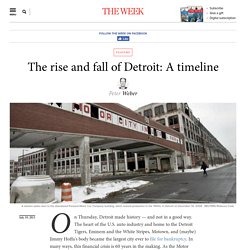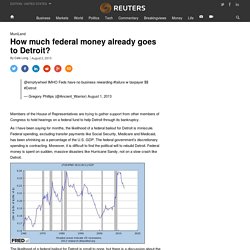

The rise and fall of Detroit: A timeline. Sign Up for Our free email newsletters On Thursday, Detroit made history — and not in a good way.

The heart of the U.S. auto industry and home to the Detroit Tigers, Eminem and the White Stripes, Motown, and (maybe) Jimmy Hoffa's body became the largest city ever to file for bankruptcy. In many ways, this financial crisis is 60 years in the making. As the Motor City faces an uncertain future, here's a look back at some key dates in the long, storied past of one of America's great cities: July 24, 1701Antoine de La Mothe Cadillac establishes a French settlement, Fort Ponchartrain du Détroit (the strait), along with 100 French soldiers and an equal number of Algonquins. 1760Britain wins the city from the French. 1796U.S. forces capture Detroit from the British. Feb. 1, 1802Detroit becomes a chartered city, covering about 20 acres. 1827Detroit adopts its forward-looking city motto: Speramus Meliora; Resurget Cineribus (We hope for better days; it shall rise from the ashes). 1899Ransom E.
Nine Reasons Why Detroit Failed. My hometown of Detroit has been studied obsessively for years by writers and researchers of all types to gain insight into the Motor City’s decline.

Indeed, it seems to have become a favorite pastime for urbanists of all stripes. How could such an economic powerhouse, a uniquely American city, so utterly collapse? Most analysis tends to focus on the economic, social and political reasons for the downfall. Detroit Rising: Life after bankruptcy. Everything You Need To Know About Detroit’s Fight Between Investors And Retirees. Two weeks ago, Detroit filed for bankruptcy protections, saying it is unable to pay back the roughly $18 billion it owes.

The bankruptcy faces legal challenges from creditors who say emergency manager Kevyn Orr did not negotiate with them in good faith, and intended to steer the city into bankruptcy court. Emails from the winter involving Orr and state officials seem to support that claim. But if Orr can beat the legal hurdles and have the bankruptcy filing approved by a judge, the city will no longer need the approval of its creditors to repay less than what they are owed.
And then what happens? Here’s everything you need to know about who is owed what and how they might fair if the bankruptcy goes forward: Who does Detroit owe? “Unsecured” creditors, on the other hand, face steep cuts. How Detroit Deadbeats Taught Tax Collectors That Threats Really Work. © Ben Steverman BC-HOW-DETROIT-DEADBEATS-TAUGHT-TAX-COLLECTORS-THAT-THREATS-REALLY-WORK For a while there, Detroit’s income tax might as well have been optional.

About 400,000 people—residents and anyone working inside the city limits—are required to file a tax return to Detroit. Almost half of them weren’t doing so. Perhaps that explains, in part, why the city filed for bankruptcy four years ago. Detroit “sent out thousands of letters to people,” said Debra Pospiech, the city’s deputy treasurer for tax. Getting people to pay taxes is a problem everywhere, of course, but Detroit had a particularly hard time going after scofflaws because budget cuts decimated its ability to enforce the law. How much federal money already goes to Detroit? @emptywheel IMHO Feds have no business rewarding #failure w taxpayer $$ #Detroit— Gregory Phillips (@Ancient_Warrior) August 1, 2013 Members of the House of Representatives are trying to gather support from other members of Congress to hold hearings on a federal fund to help Detroit through its bankruptcy.

As I have been saying for months, the likelihood of a federal bailout for Detroit is miniscule. Federal spending, excluding transfer payments like Social Security, Medicare and Medicaid, has been shrinking as a percentage of the U.S. GDP. The federal government’s discretionary spending is contracting. The likelihood of a federal bailout for Detroit is small to none, but there is a discussion about the funds that the federal government sends to Detroit on an annual basis. Bloomberg wrote: President Barack Obama proposed giving Colombia about $323 million in aid next year, mostly to combat drug trafficking and violence.
Detroit is already getting significant federal funds. Property taxes going down for over half of Detroiters. Detroit — More than half of Detroit’s residential property owners will have lower property tax bills this year, but 41 percent can expect modest increases, city officials said Monday.

The Duggan administration unveiled the proposed 2017 property assessments on the heels of the first parcel-by-parcel reappraisal of the city’s nearly 255,000 residential properties in 60 years. “It’s been a three-year process, and today we will be sending out the assessment notices and everybody will get an assessment based upon their individual houses,” Mayor Mike Duggan said during a news conference Monday at City Hall. “...
Getting the assessment right is something that every homeowner should be entitled to just expect.” Officials said approximately 140,000 homeowners will see reductions in their taxes of about $263 each. About 12,000 will see an average increase of about $80 each and the remaining 6 percent of property owners will see larger adjustments. Michael J. Cferretti@detroitnews.com. Motor City: The Story of Detroit. Billions in Debt, Detroit Tumbles Into Insolvency NYTimes com.